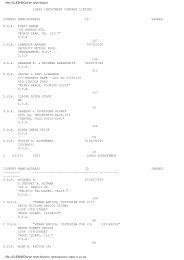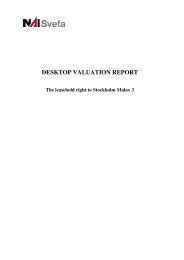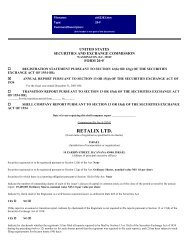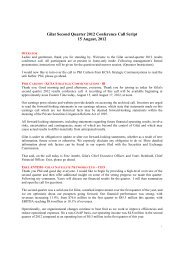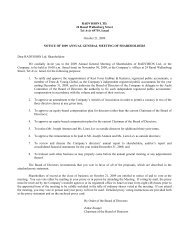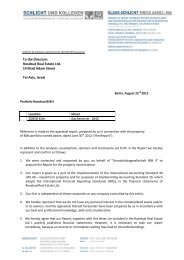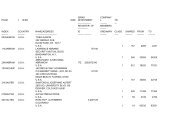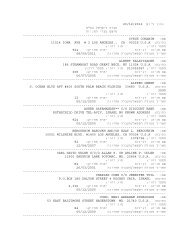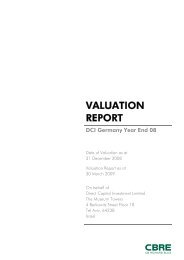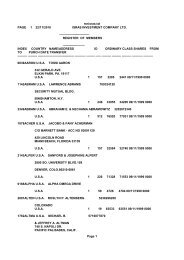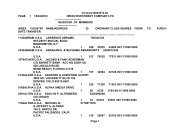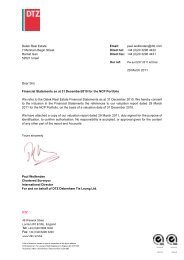XTL BIOPHARMACEUTICALS LTD.
XTL BIOPHARMACEUTICALS LTD.
XTL BIOPHARMACEUTICALS LTD.
Create successful ePaper yourself
Turn your PDF publications into a flip-book with our unique Google optimized e-Paper software.
In January 2007, <strong>XTL</strong> Development, Inc., or <strong>XTL</strong> Development, our wholly-owned subsidiary, signed an agreement with DOV to in-license<br />
the worldwide rights for Bicifadine, a serotonin and norepinephrine reuptake inhibitor. <strong>XTL</strong> Development is developing Bicifadine for the treatment of<br />
diabetic neuropathic pain, a chronic condition resulting from damage to peripheral nerves. In accordance with the terms of the license agreement, <strong>XTL</strong><br />
Development made an initial up-front license payment of $7.5 million in cash. In addition, <strong>XTL</strong> Development will make milestone payments of up to<br />
$126.5 million over the life of the license, of which up to $115 million will be due upon or after regulatory approval of the product. These milestone<br />
payments may be made in either cash and/or our ordinary shares, at our election, with the exception of $5 million in cash, due upon or after regulatory<br />
approval of the product. <strong>XTL</strong> Development is also obligated to pay royalties to DOV on net sales of Bicifadine. In connection with the license<br />
agreement, <strong>XTL</strong> Development committed to pay a transaction advisory fee to certain third party intermediaries. The transaction advisory fee was<br />
structured in the form of stock appreciation rights (“SARs”) in the amount equivalent to (i) 3% of our fully diluted ordinary shares at the close of the<br />
transaction (representing 8,299,723 ordinary shares), vesting immediately and exercisable one year after the close of the transaction, and (ii) 7% of our<br />
fully diluted ordinary shares at the close of the transaction (representing 19,366,019 ordinary shares), vesting following the first to occur of successful<br />
Phase 3 clinical trial results or the acquisition of our company. Payment of the SARs by <strong>XTL</strong> Development can be satisfied, at our discretion, in cash<br />
and/or by issuance of our registered ordinary shares. Upon the exercise of a SAR, the amount paid by <strong>XTL</strong> Development will be an amount equal to<br />
the amount by which the fair market value of one ordinary share of our company on the exercise date exceeds the $0.34 grant price for such SAR (fair<br />
market value equals (i) the greater of the closing price of an ADR on the exercise date, divided by ten, or (ii) the preceding five day ADR closing price<br />
average, divided by ten). The SARs expire on January 15, 2017. In the event of the termination of the license agreement, any unvested SARs will<br />
expire.<br />
Business Overview<br />
Introduction<br />
We are a biopharmaceutical company engaged in the acquisition and development of pharmaceutical products for the treatment of unmet<br />
medical needs, particularly the treatment of diabetic neuropathic pain and hepatitis C.<br />
Our lead compound is Bicifadine. We are developing Bicifadine for the treatment of diabetic neuropathic pain, a chronic condition resulting<br />
from damage to peripheral nerves. In September 2007, we initiated a Phase 2b trial that is aimed at demonstrating the efficacy of Bicifadine in diabetic<br />
neuropathic pain. Bicifadine is a serotonin and norepinephrine reuptake inhibitor, or SNRI. Compared to the currently approved SNRI’s, Bicifadine has<br />
a unique ratio of serotonin versus norepinephrine reuptake inhibition, which is weighted toward norepinephrine reuptake inhibition, thereby providing<br />
a strong scientific rationale for testing Bicifadine for the treatment neuropathic pain indications. Prior to it being in-licensed, Bicifadine was<br />
extensively tested in more than 15 clinical trials involving over 3,000 patients, and has been shown to be safe and generally well tolerated. Bicifadine<br />
was evaluated in various acute pain indications, including two large, randomized clinical trials (n=750 and n=540) in patients suffering from acute post<br />
dental surgery pain, where Bicifadine demonstrated statistically significant efficacy. Bicifadine was also studied in chronic lower back pain studies,<br />
where it did not demonstrate statistically meaningful improvement in pain scores. Given the heterogeneity of the patient population, the diversity of<br />
sources of pain, and the significant psychological component, chronic lower back pain is considered a highly challenging pain model. <strong>XTL</strong> believes<br />
that a positive statistical and clinical benefit can be shown by assessing the drug’s effect in a more homogenous and well-studied model such as<br />
diabetic neuropathic pain in which other SNRIs have been shown to be effective.<br />
Our second program is the Diversity Oriented Synthesis, or DOS, program, which is focused on the development of novel pre-clinical<br />
hepatitis C small molecule inhibitors. Compounds developed to date inhibit HCV replication in a pre-clinical cell-based assay with potencies<br />
comparable to clinical stage drugs. On March 20, 2008, we announced that we had out-licensed the DOS program to Presidio.<br />
To date, we have not received approval for the sale of any of our drug candidates in any market and, therefore, have not generated any<br />
commercial revenues from the sales of our drug candidates. Moreover, preliminary results of our pre-clinical or clinical tests do not necessarily predict<br />
the final results, and acceptable results in early preclinical or clinical testing might not be obtained in later clinical trials. Drug candidates in the later<br />
stages of clinical development may fail to show the desired safety and efficacy traits despite having progressed through initial clinical testing.<br />
Our Strategy<br />
Under our current strategy, we plan to:<br />
• complete our Phase 2b program for Bicifadine for the treatment of diabetic neuropathic pain;<br />
• advance the development of Bicifadine towards approval in diabetic neuropathic pain and possibly in other related indications either<br />
alone or with a corporate partner; and<br />
• seek to in-license or acquire additional candidates.<br />
17



